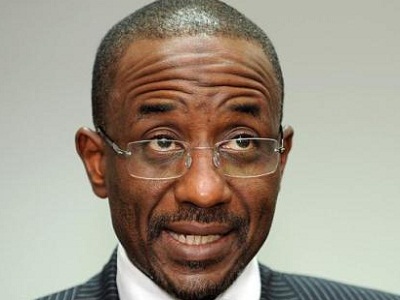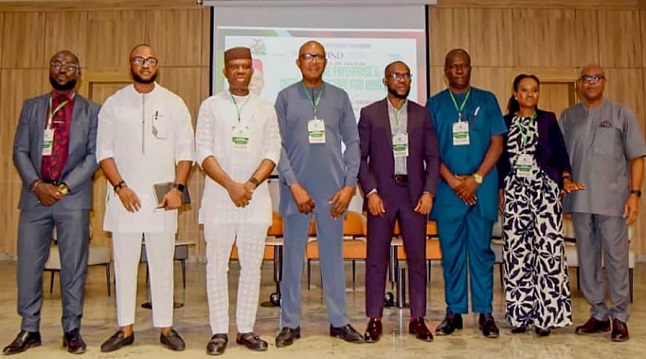General News
ICT @ Work for Air Navigation- Ifeanyi

Ogochukwu Ifeanyi, chief information officer (CIO), Nigerian Airspace Management Agency (Nama), has over 15 years experience in the information and technologies space. His first class education locally and internationally stands him out. Ogochukwu, a Microsoft Global Hero is also a member of several professional bodies both national and international. He spoke to peter ugwu on state of ICT in Nigeria’s Aviation Industry.
ICT Department of Nama
Thank you. Well the ICT department in Nama is structured into four principal business units, namely Information Technology Service Management (ITSM); Business Intelligence Systems (BIS), Network Communications (NetComs) and Business Operations Support (BOS) reporting to the CIO.
For us in ICT department, to underscore our critical role and align technology to corporate business objectives we couched a vision which is, “…making ICT work for air navigation” with a supporting mission statement: “to provide leadership and guidance, service and support, education and technical expertise required to establish and maintain information communications technology systems for the Agency in accordance with its vision, mission, values and goals.”.
As you can see from this simple overview of the department that it completely aligns with and supports the vision and mission of Nama which is “To be one of the Leading Air Navigation Service Providers (ANSP) in the world” and “To provide safe, efficient and economic Air Navigation Services to airspace users, through the development of new technologies and dedicated workforce” respectively.
Total Radar Coverage of the Nigerian Airspace (TRACON)
First you need to understand that the TRACON project was a quantum leap for Nigeria in the area of rapid improvement of the existing CNS/ATM Infrastructure. It was therefore conceived as a key requirement for the modernization of Nigerian Air Traffic Management Infrastructure. It has Approach and Automated Area Control components. It was as major paradigm shift from analogue to digital technology, of course it also included satellite technologies.
You see the Nigerian TRACON project is a proudly Nigerian successful project that was executed by committed and dedicated Nama professionals and its one the best in Africa if not in the world. It’s an aviation state of the art cutting edge technology surveillance system manufactured by Thales of France. It has a support service program that ensures the continuous availability of this service for the safety of air navigation.
Its effectiveness is not questionable because it covers the Nigerian Airspace and even the contiguous (Flight Information Regions (FIRs) like Niamey, Brazzaville, Accra, etc.
Taking Over the Airfield Lighting, Bird Hazard Control from FAAN and Calibration Unit from NCAA
Well you aware it was a ministerial directive to Nama to take over that responsibility and Nama along with the relevant parastatals have complied.
The official handovers by NCAA and FAAN to Nama of the Flight Calibration Unit and the Airfield Lighting/Bird, Wild Life Control respectively has been done.
The parastatals have put in place well structured procedures and processes for this engagement and the process is already being consummated for smooth transition and transfers.
Settling Down to Work with the Huge Responsibilities
Nama through its thorough bred professional MD/CE has taking the new responsibilities in its stride and are gracefully re-engineering and transforming that part of the aviation environment in line with the Federal Government agenda for aviation as enunciated by the Honourable Minister of Aviation (HMA).
Nama is proactively building and enhancing capacity to ensure that it remains consistent with is excellent service delivery framework.
Dana Airline Crash and ICT
Well I will speak for Nama here and won’t hold brief for other agencies within the aviation sector. Nigeria is a class 2 International Civil Aviation Organization (ICAO) contracting state and therefore operates in line with ICAO standards and Recommended Practices (SARPs). Nama in line with African and Indian Ocean (AFI) Region and ICAO Global Communications Navigations Surveillance and Air Traffic Management (CNS/ATM) plans is implementing its National CNS/ATM plan. That basically tells you that Nama as an organization is focused on international best practice and is implementing its informational and all technological infrastructure and human capital asset on that premise.
Installation of AIS Automation Antennas
This is a very critical safety project. Of course we are on course regarding that. All the processes have been completed to enable for the rapid deployment of not just the antennas but the VSAT System.
Migration from Terrestrial Air to Satellite-based Navigation
I need to quickly give a background to this: The advent of Global Navigation Satellite System (GNSS) as a modern trend in air Navigation requires that spatial co-ordinate of points (be) established on an ICAO acceptable international terrestrial reference framework known as WGS-84. The reason being that, the future air navigation system will also use Communications, Navigations, and Surveillance (CNS) technologies tied to the WGS-84 platform to function.
The completion of the project therefore enabled for Performance –Based-Navigation (PBN) implementation with deliverables that will enable us to transit form Terrestrial to Satellite based systems.
Having said that the significance of the successful pilot flight test indicates that migration is positive and more importantly the features include: more flexible and direct routing i.e. pilot preferred trajectories; enables instrument approach where and when NAVAIDs is unavailable, no ground based equipment, no electric power required while the accrued benefits include reduced fuel consumption and emissions, reduction of flight distances/times, increased availability of airports in poor weather conditions, life cycle cost savings even for the airlines .
Capacity to Sustain the Process when Fully Adopted
Don’t forget that this is a satellite enabled navigation service but really apart from that Nama has in the course of this project engaged in capacity building across the industry. Trainings were done for the industry stakeholders: Airlines, Nama, NCAA, FAAN, Air force amongst others.
Nama has also gone ahead to train Air Traffic Controllers in Lagos and Kano on this new service delivery and more will be trained. These are all geared towards ensuring that the necessary capacity is available.
Recent Dana Air Crash
The recent Dana Air Crash was a tragic one for Nigeria and particularly for my organization and my person because we lost a dear colleague, friend and brother in the same crash. It was such a sad and unfortunate incident and my take is simple we should wait for the reports of the various investigations. I believe there will be valuable lessons to be learned.
Clamor for Merger among Airlines
Interestingly Airlines are business concerns and they are in business to invest and get returns on such investments. It’s not Nama’s remit to regulate airline operations but there are regulatory framework and controls that governs airlines operations which every potential or existing airline must continuously meet.
Human Capital
Nama values its human capital as a critical asset and therefore invests in its people. Continuous training and re– training is an inherent culture of NAMA because she recognizes the need for a highly professionalized competent workforce in a safety critical domain such as Air Navigation.
General News
Court Fines Lafarge Africa N2m for Using Ex-Employee’s Name, Details Online after Dismissal

National Industrial Court of Nigeria in Lagos has ordered Lafarge Africa Plc to pay N2 million in damages to a former employee after finding that the company unlawfully retained and continued using his personal data years after his exit.

In a judgment delivered on February 17, 2026, in Suit No. NICN/LA/60/2022, Justice Ikechi Gerald Nweneka ruled that the cement manufacturer breached the claimant’s right to privacy by listing his name and contact details in official purchase orders long after his employment ended.
Mr. Kehinde Adeniyi Johnson, claimant, had approached the court in February 2022, alleging that although he left the company in November 2019, his name, personal email address and phone number remained attached to Lafarge’s.
He sought multiple declarations and N50 million in general and aggravated damages, arguing that the continued use of his identity amounted to unlawful usage, fraudulent misrepresentation and emotional distress.
According to court filings, Johnson told the court that he kept receiving calls, emails and WhatsApp messages from suppliers and logistics agents regarding consignments intended for Lafarge.
He recounted an incident involving a shipment from India: after being contacted by a dispatcher, he accepted delivery but was denied access to company premises upon arrival.
He later alleged that he was attacked by armed robbers in the aftermath, blaming the exposure created by the company’s continued use of his identity.
Lafarge denied liability, attributing the issue to a system malfunction. The company maintained that it deactivated Johnson’s official email and server access upon his departure and notified relevant suppliers of his disengagement.
It also challenged the court’s jurisdiction, arguing that claims relating to tort and emotional distress fell outside the court’s scope.
In addressing preliminary objections, Justice Nweneka dismissed the company’s challenge to the admissibility of emails and WhatsApp messages tendered as evidence, holding that the communications were not hearsay since they involved the claimant and company representatives.
On jurisdiction, the court held that the dispute stemmed directly from the employment relationship and therefore fell within its competence.
It further clarified that the suit was not brought under the Fundamental Rights Enforcement Procedure Rules, making it properly instituted before the court.
After reviewing the evidence, the judge found that Lafarge continued to use Johnson’s name and telephone number in purchase orders well after his exit, thereby violating the Nigeria Data Protection Act and Section 37 of the 1999 Constitution, which guarantees the right to privacy.
he court also upheld the claim for intentional infliction of emotional distress, describing the company’s conduct as reckless, particularly after it had been formally notified by the claimant’s solicitors.
However, several other claims including those relating to human dignity, tortious interference, indemnification and aggravated damages were dismissed for lack of proof or improper framing.
In awarding N2 million in damages, the judge cited statutory limits under the data protection law and the principle of proportionality.
The court further directed Lafarge to permanently erase the claimant’s personal data from its servers, applications and procurement systems, and to deactivate any pre-generated codes bearing his name.
General News
WhatsApp Faces Regulatory Obstacles in Africa

Mark Zuckerberg’s tech empire is once again under regulatory pressure in Africa after competition authorities across 21 markets launched a formal probe into changes affecting WhatsApp’s AI ecosystem.

The Common Market for Eastern and Southern Africa (COMESA) Competition and Consumer Commission has opened an investigation into Meta Platforms over amendments made in October 2025 to the WhatsApp Business Solution Terms.
At the heart of the probe is whether the updated rules unfairly restrict third-party artificial intelligence providers from accessing the WhatsApp Business API, while preserving full integration for Meta’s own AI tools, including Meta AI.
In a notice issued by the regulator, the commission said it has “reasonable cause to suspect” that Meta may hold a dominant position in the common market and that the changes could “substantially lessen competition” by excluding rival AI service providers from what it described as a crucial digital gateway.
The investigation spans 21 member states, including Kenya, Egypt, Ethiopia, Uganda and Zambia. Stakeholders have been invited to submit feedback before 16 March 2026, with regulators emphasising that the move marks the start of a fact-finding process, not a ruling of wrongdoing.
This is not the first time Meta has faced scrutiny in Kenya and East Africa. Kenyan authorities have previously examined major digital platforms over data protection, misinformation and labour practices. In Nigeria, the data protection regulator fined Meta over privacy violations, underscoring growing African oversight of global tech firms.
Globally, the company is also navigating regulatory headwinds. The European Commission and Italy’s competition authority have reviewed Meta’s AI integrations on WhatsApp amid concerns about potential restrictions on rival chatbot providers. In the United States, Meta has faced antitrust litigation over its broader market dominance.
For Africa’s digital economy, the stakes are high as WhatsApp remains one of the continent’s most widely used platforms for communication, commerce and customer engagement. Across COMESA’s 21 markets, millions of small businesses rely on WhatsApp Business to reach customers, while startups are increasingly building AI-driven services on top of the platform.
If regulators determine that access to WhatsApp’s business interface is being restricted in favour of Meta’s own AI tools, there is genuine concern that it could limit opportunities for African developers and startups seeking to innovate in the fast-evolving AI space.
General News
NITDA, Abia Partner on Enterprise Architecture Reform

In alignment with President Bola Ahmed Tinubu’s priority areas of economic reform, digital innovation, and improved governance, the National Information Technology Development Agency (NITDA) has reiterated its commitment to supporting sub-national governments in building integrated, data-driven systems that enhance service delivery and drive sustainable growth.

This commitment was reinforced at the Future Enterprise & Data Architecture of Abia State workshop themed “One Citizen, One Identity: Unlocking Data-Driven Governance.” The high-level engagement brought together policymakers, technocrats, and development partners to chart a pathway toward a unified digital public sector anchored on interoperability and citizen-centric governance.
The workshop, organised by the state’s Ministry of Budget and Planning and declared open by Governor Alex Otti, who was represented by the Deputy Governor, Engr Ikechukwu Emetu, focused on strengthening interoperability among Ministries, Departments, and Agencies (MDAs) to enhance revenue generation and improve service delivery across the state.
Speaking during a panel session titled “Breaking Silos, Building One Government,” the Director General of NITDA, Kashifu Inuwa CCIE, who was represented by the Agency’s Director of Stakeholder Management and Partnership, Dr Aristotle Onumo, emphasised that collaboration remains the cornerstone of successful digital transformation.
“One thing that is very clear is partnership and collaboration. If you want to take advantage of collective intelligence, then partnership is the key. If you want to succeed in building a unified government system, collaboration is the way to go,” he stated.
He stressed that digital transformation is not merely about deploying technology but about transforming people and culture. According to him, resistance to change and entrenched institutional silos can undermine even the most sophisticated technological frameworks if mindset shifts are not prioritised.
“Digital transformation is as much about people as it is about process and technology. If culture resists change, it can undermine strategy at every level. We must move from control to collaboration, and from isolation to integration,” he added.
Highlighting NITDA’s strategic direction, the DG noted that the Agency’s action plan prioritises digital literacy as a foundational pillar for national development. He disclosed that NITDA is targeting 70 per cent digital literacy nationwide through structured interventions, including training 30 million Nigerians across formal and informal sectors using digital learning platforms deployed through community and institutional partnerships.
He further revealed that digital education is being integrated into school curricula at primary, secondary, and tertiary levels, while civil servants across the federal public service are undergoing digital capacity development programmes to enhance institutional efficiency and readiness for interoperable governance systems.
On interoperability, Inuwa described it as “not optional but a necessity” for achieving data integrity, efficiency, and innovation in governance. He explained that NITDA is developing a national interoperability framework and advancing Enterprise Architecture (EA) initiatives across government institutions to ensure seamless data exchange.
“When we talk about interoperability, we mean that data generated in one agency should be accessible and usable by another in a consistent and secure format, without contradiction or confusion. That is how you build one government, not multiple disconnected systems,” he explained.
He added that a robust interoperability framework would not only improve internal government efficiency but also create a platform for innovation, enabling startups and young innovators to build solutions on structured public datasets.
While commending the state’s leadership for its vision and commission, he said, “If we achieve even 80 per cent of what has been presented here, Abia will not only lead among states, but it will also become a national reference point for digital innovation.”
The workshop concluded with a renewed call for stronger federal–state collaboration, policy alignment, and sustained investment in digital capacity to ensure that the vision of “One Citizen, One Identity” translates into tangible socio-economic impact.

 News3 days ago
News3 days agoABoICT Lecture 2026 to Focus on Impact of AI, IoT on Business Operational Efficiency

 General News3 days ago
General News3 days agoLeo Stan @ 70: Blessed and Bruised by Country, Eyes Next Disruption

 General News2 days ago
General News2 days agoZinox Technologies and TD Africa Forge Strategic Partnership to Revolutionize African Tech Ecosystem

 Telecom2 days ago
Telecom2 days agoUwaje Pays Tribute to Leo Stan Ekeh @70

 E-Financial2 days ago
E-Financial2 days ago$214Bn Missing, Institutions Silent: Is Accountability Dead in Nigeria?

 Telecom2 days ago
Telecom2 days agoCyber Immunity Emerges as Shield for Nigerians Amid Rising Scams

 General News2 days ago
General News2 days agoNITDA, Abia Partner on Enterprise Architecture Reform

 E-Business2 days ago
E-Business2 days agoInterswitch Partners Abia to Digitise Public Hospitals














